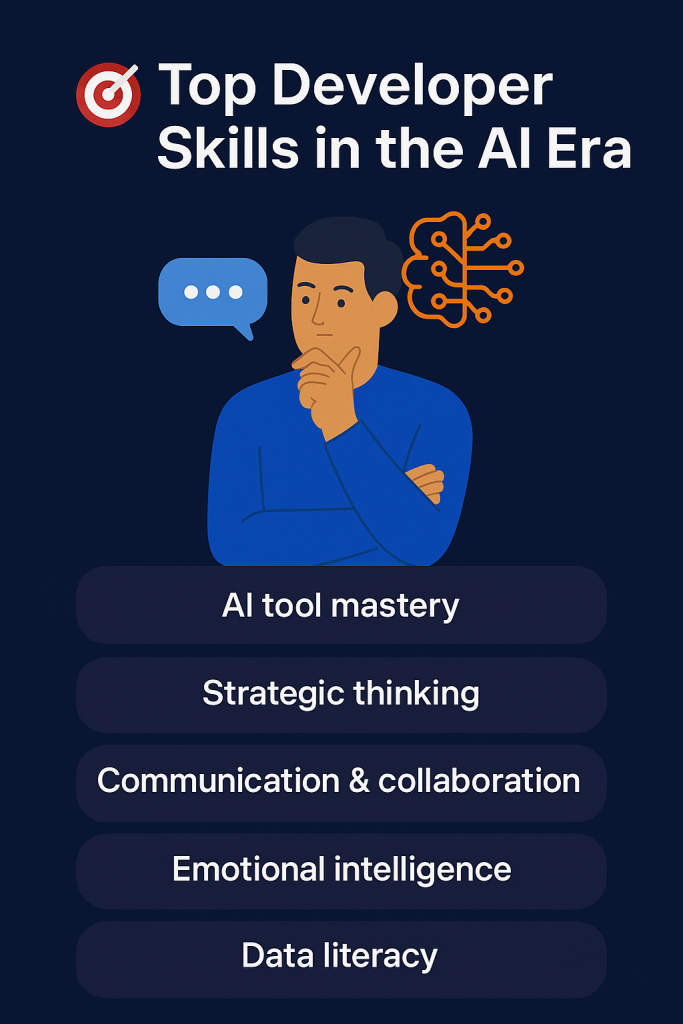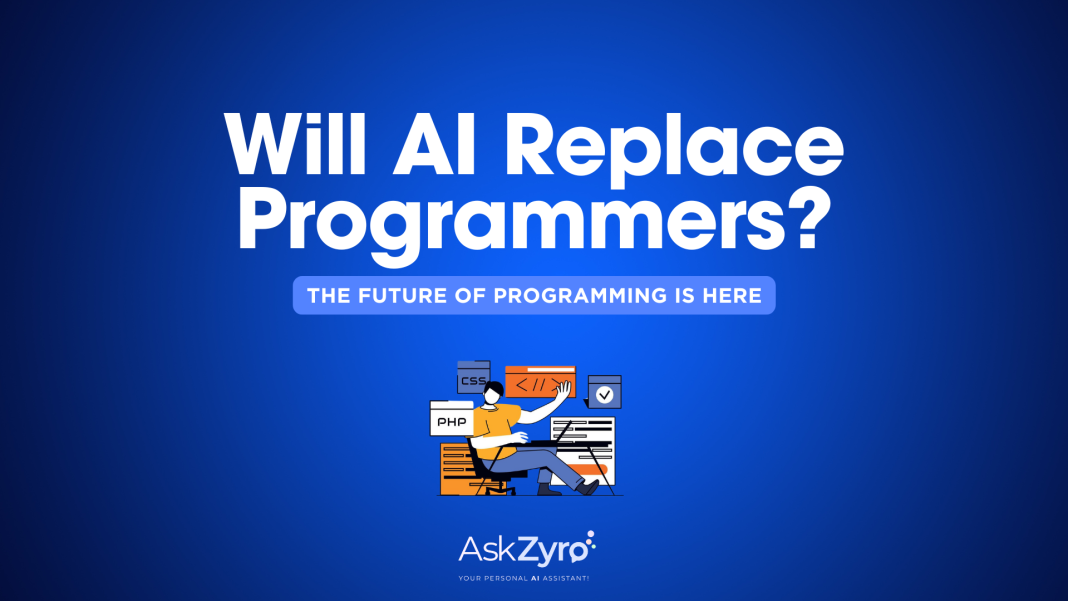The rise of AI in software development has sparked intense debate about job security in programming. Many developers worry about their future as AI tools become better at writing code. These concerns are valid, but the reality is more complex than simple replacement.
AI will not completely replace human programmers, but it will transform the nature of programming jobs. While basic coding tasks may be automated, experienced developers will remain crucial for providing architectural vision and solving complex problems.
We’re seeing a shift toward new roles like prompt engineering and AI integration specialists. The tools are changing, but the need for human creativity, problem-solving, and strategic thinking in software development remains strong.
Key Takeaways
- AI tools enhance programmer productivity but won’t replace human creativity and complex problem-solving abilities
- Software developers need to adapt their skills to include AI tool expertise and system architecture design
- The programming field is evolving toward specialized roles that combine technical knowledge with AI capabilities
The Evolution of Software Development with AI
AI technology transforms how we write, test, and maintain code. The tools we use today combine human expertise with machine learning to create more efficient development processes and higher quality software.
AI Tools and Their Impact on Coding
AI-powered development tools now handle many routine coding tasks. GitHub Copilot suggests code completions and helps us write repetitive code segments faster.
These tools excel at pattern recognition and can spot potential bugs before they cause problems. They also help us maintain consistent coding standards across projects.
Modern AI assistants can convert natural language descriptions into working code snippets, making programming more accessible to developers at all skill levels.

Generative AI and Code Generation
McKinsey estimates that generative AI could add up to $4.4 trillion to the global economy through improved software development processes.
AI code generators can:
- Create basic function templates
- Suggest optimizations for existing code
- Generate unit tests automatically
- Provide documentation drafts
The quality of AI-generated code improves steadily, though human review remains essential for complex logic and security-critical components.
Integrating AI into the Software Development Lifecycle
New programming languages now include built-in features for AI integration. This makes it easier to incorporate machine learning capabilities into applications.
We’re seeing AI assist in:
- Requirements analysis
- Code review processes
- Bug detection and fixing
- Performance optimization
- Deployment automation
Teams using AI tools report faster development cycles and fewer routine errors in their code. The focus shifts from writing basic code to solving complex problems and improving user experiences.
Automation and Job Displacement
AI technology changes programming work by automating routine tasks while creating new opportunities for skilled developers who can work alongside AI tools.
AI’s Role in Automating Repetitive Tasks
Data entry and clerical tasks face the highest risk of automation. In software development, AI already handles code formatting, bug fixes, and basic testing.
AI tools excel at repetitive programming tasks like generating boilerplate code and documentation. This frees up developers to focus on complex problem-solving and system architecture.
We see AI taking over basic coding tasks that once consumed hours of developer time. Yet these tools still need human guidance to ensure quality and maintain best practices.
The Future of Employment for Software Developers
Around 40% of working hours could be impacted by AI language models. For software developers, this means adaptation rather than replacement.
New roles are emerging for AI specialists and developers who can:
- Build AI systems
- Integrate AI tools into existing workflows
- Oversee AI-powered development processes
Young professionals aged 18-24 express more concern about AI replacing their jobs compared to older workers. Yet the field continues to grow with new specializations.
Human Oversight in an AI-Driven Era
We still need human developers to make critical decisions about system design, security, and ethical considerations. AI tools require experienced programmers to validate their output and ensure code quality.
Programming jobs now emphasize skills that AI cannot replicate:
- Strategic thinking
- Client communication
- Complex problem-solving
- Team leadership
AI enables productivity gains while creating opportunities for developers who adapt to working with these new tools.
Advancing Creativity and Problem-Solving
AI tools are transforming how developers approach creative work and solve complex programming challenges. These technologies enhance our ability to innovate while tackling difficult technical problems more efficiently.
Enhancing Developer Creativity Through AI
AI-powered coding assistants help us explore new approaches to software development by suggesting alternative solutions we might not have considered.
We can now focus more on creative design aspects while AI handles repetitive coding tasks. This lets us experiment with different architectural patterns and innovative features more freely.
Natural language processing enables us to describe desired functionality in plain English, turning our creative ideas into working code more quickly. We spend less time on syntax and more time on designing elegant solutions.
AI and Complex Problem-Solving in Programming
Advanced debugging tools powered by AI help us identify and fix errors faster than traditional methods. This speeds up our development cycle and improves code quality.
We use machine learning algorithms to analyze complex patterns in our code and suggest optimizations. This helps us create more efficient solutions to challenging programming problems.
Quality assurance becomes more thorough as AI helps us detect potential issues early in development. We can test edge cases more comprehensively and ensure our code meets high standards.
Critical thinking remains essential as we guide AI tools toward optimal results. We evaluate AI suggestions and ensure they align with project requirements and best practices.

Ethics, Skills and the Future of Programming
AI tools are reshaping programming work while creating new ethical challenges and skill requirements. Programmers need to focus on both technical excellence and responsible development practices to stay relevant in this changing landscape.
The Ethical Considerations of AI in Programming
The impact of AI on society raises important questions about responsibility and fairness. We must ensure AI-assisted code meets high ethical standards and doesn’t perpetuate biases.
Transparency in AI-generated code is crucial. We need clear documentation of where AI tools were used and how decisions were made.
Data privacy and security cannot be compromised. AI systems must be trained on properly licensed code while respecting intellectual property rights.
The Need for Adaptation and Continuous Learning
Modern programmers must develop new skills beyond traditional coding. Key areas include:
- AI system training and supervision
- Data science fundamentals
- Problem-solving at a higher level
- Strong communication abilities
- Emotional intelligence for team collaboration
Professional development should be ongoing. We need to embrace continuous learning through courses, workshops, and hands-on projects.
Predictions for the Long-term Impact of AI on Programming
AI will enhance programming careers rather than replace them. Expert programmers will focus on system architecture and strategic planning.
Basic coding tasks will become automated. This shift will free up time for complex problem-solving and innovation.
Teams will blend AI expertise with human creativity. We’ll need people who can bridge the gap between AI capabilities and business needs.
The most successful programmers will be those who view AI as a collaboration tool rather than competition.
Frequently Asked Questions
AI’s impact on programming careers remains a complex topic that requires examining multiple angles. The technology shows promise as a productivity tool while raising valid concerns about job displacement.
How will AI impact the job market for programmers in the near future?
AI tools are transforming basic coding tasks and customer support roles through automation. This shift primarily affects entry-level positions and routine programming work.
We expect to see a growing demand for programmers who can effectively work alongside AI tools rather than those who only write basic code.
What is the projected influence of AI on coding professions within the next decade?
Up to 80% of programming jobs will remain centered around human developers. The focus will shift toward higher-level design and problem-solving skills.
AI will handle more routine coding tasks, pushing developers to develop expertise in system architecture and complex problem-solving.
How might advancements in AI challenge the demand for programming skills in the job market?
Low-skilled coding positions face the greatest risk of automation. Basic code generation and simple debugging tasks will increasingly be handled by AI systems.
Programming roles requiring creativity, strategic thinking, and complex problem-solving will remain secure and may even increase in value.
In what ways could AI augment the roles of software developers rather than replace them?
AI serves as a powerful assistant for code completion, bug detection, and routine task automation. We see these tools enhancing developer productivity rather than replacing human expertise.
Developers who master AI-powered tools gain significant advantages in speed and efficiency.
What career advice is given to programmers in an era incrementally influenced by AI technology?
We recommend focusing on high-level skills like system architecture, AI integration, and complex problem-solving. Learning to effectively use AI tools while developing deep technical expertise creates a strong career foundation.
Staying current with AI developments and adapting to new tools helps maintain career relevance.
How likely is it that AI will autonomously perform programming tasks, and what does that mean for current programming jobs?
AI excels at generating basic code and automating routine tasks, but struggles with complex architectural decisions and novel problem-solving.
Complete automation of programming remains unlikely. The role of programmers will evolve to focus more on oversight, architecture, and strategic decision-making.

